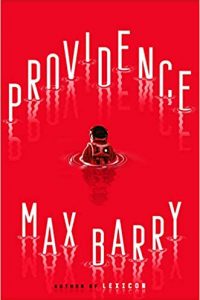Alec Nevala-Lee Reviews The Pleasant Profession of Robert A. Heinlein by Farah Mendlesohn
 The Pleasant Profession of Robert A. Heinlein, Farah Mendlesohn (Unbound 978-1-78352-678-9, £25.00, 480pp, hc) March 2019.
The Pleasant Profession of Robert A. Heinlein, Farah Mendlesohn (Unbound 978-1-78352-678-9, £25.00, 480pp, hc) March 2019.
In The New Biographical Dictionary of Film, the critic David Thomson arrives at “a major but very difficult realization” about Cary Grant:
As well as being a leading box-office draw for some thirty years, the epitome of the man-about-town… as well as being the retired actor, still handsome executive of a perfume company – as well as all these things, he was the best and most important actor in the history of the cinema.
A similar moment of insight may well be overdue about Robert A. Heinlein, who, in addition to being the most successful science fiction writer of his time, a posthumous source of inspirational quotes, and the intellectual icon of libertarians, patriots, and polyamorists, presents a strong case for being the best and most important author the genre has ever produced.
If this statement feels at all controversial, it’s partially because the qualities that make Heinlein so indispensable – his variety, his productivity, his bewildering evolution over half a century – also contribute to his elusiveness. A generational shift in his reception has left him even harder to grasp. Fewer young fans these days have grown up reading the Heinlein juveniles, which inspired many of their original readers to become scientists or engineers. Their impressions are more likely to be secondhand, or shaped by a few bestselling novels – Starship Troopers, Stranger in a Strange Land, The Moon Is a Harsh Mistress – that offer an incomplete picture when taken on their own. As a result, Heinlein is in desperate need of informed critics who have read everything and can put the result into a sensible order.
Heinlein has never lacked for critical attention, but many of his works should be approached with caution. During his lifetime, the most comprehensive treatments were by authors – Alexei Panshin, H. Bruce Franklin, Leon Stover – who had met Heinlein and had passionate feelings about him as a person, while the majority of the more recent surveys, although often valuable, are labors of love by specialists with an emotional stake in his legacy. The Pleasant Profession of Robert A. Heinlein by Farah Mendlesohn, by contrast, is the kind of book that a writer of his stature deserves – an academic but readable overview from a modern perspective, covering his full career, and written by a scholar of wide interests and learning whose ideas have been shaped by something more than reading Heinlein himself.
“As a historian, I am perfectly happy to know that I like Heinlein without feeling that it is essential that newcomers to science fiction need to read him,” Mendlesohn writes, which is a statement that is hard to imagine appearing in most earlier books on the subject. Yet Mendlesohn’s even-handed approach – with its unhurried investigation of everything that seems important – amounts to a more persuasive argument for Heinlein’s significance than any of the studies that take his greatness for granted. Despite his abundance of “single-issue admirers,” Heinlein demands to be seen in his entirety, and although this long book may be daunting to novices, readers familiar with the overall scope of his achievement will be rewarded with a trove of insights into what Mendlesohn calls Heinlein’s lifelong “argument with himself.”
Mendlesohn does a commendable job of rescuing Heinlein from both his acolytes and his detractors. The Pleasant Profession of Robert A. Heinlein quietly corrects many of the assumptions of William H. Patterson’s monumental but uncritical biography, and it recognizes the influence of his second wife, Leslyn, who has been badly mistreated elsewhere. Mendlesohn notes that Heinlein’s insistence on reasoning from facts was undermined by his “informational isolation” on many subjects, and that his imaginative rigor was counterbalanced by a crucial streak of sentimentality. While acknowledging his shortcomings as a stylist, they rightly praise the undervalued “playfulness and serviceability” of Heinlein’s “lovely, loose, popular prose.”
When it comes to more difficult issues, Mendlesohn neatly avoids the simplifications that frequently appear on both sides: “With Heinlein it’s always a case of being a little bit more complicated than it initially seems.” Mendlesohn compares his vocal opposition to bigotry with the limitations of his nonwhite characters – whose racial identities are often reduced to “Easter eggs” in the text – and his lack of sensitivity toward institutional oppression: “Heinlein understands and opposes enslavement and colour prejudice, but he does not really see that racism has a wider infrastructure. He does not understand what we now frame as systemic racism.”
Elsewhere, Mendlesohn points out that Heinlein’s most famous aphorism on guns – “An armed society is a polite society” – falls apart in context, while their discussion of Heinlein’s “intensely personal” fascination with gender may inspire many readers to see his portrayal of women in a new light. Writing of his “yearning to get a real feeling for what women think, feel and want,” Mendlesohn concludes: “Heinlein made a conscious effort to think about what women were like, and how they thought about themselves. He tried to create for them a voice that was embodied and aware of being female in a male world. In these stories he also tried to make an argument about the possibilities for shifting that sense of self.”
This willingness to view a writer through the lens of the critic’s own time is just what we ought to expect from a serious evaluation of a figure in the main line of American literature, which is precisely how Heinlein is regarded by his fans. The Pleasant Profession of Robert A. Heinlein pays him the compliment of holding him to his own high standards. Of the strain of didacticism in his late novels, Mendlesohn writes: “In another author this might have been disastrous, but Heinlein’s inner self was sufficiently cranky, awkward and complex that there was plenty of material to mine.” This is exactly right. His mistakes were more instructive than the triumphs of most writers, and his importance needs no defending – but Mendlesohn’s calm recounting of the evidence does something even more remarkable. It makes Heinlein seem like the most interesting science fiction author around, not just of his era, but of ours.
This review and more like it in the March 2019 issue of Locus.
 While you are here, please take a moment to support Locus with a one-time or recurring donation. We rely on reader donations to keep the magazine and site going, and would like to keep the site paywall free, but WE NEED YOUR FINANCIAL SUPPORT to continue quality coverage of the science fiction and fantasy field.
While you are here, please take a moment to support Locus with a one-time or recurring donation. We rely on reader donations to keep the magazine and site going, and would like to keep the site paywall free, but WE NEED YOUR FINANCIAL SUPPORT to continue quality coverage of the science fiction and fantasy field.





My love of RAH has not not been diminished nor malnourished I Am eager to read this
“the limitations of his nonwhite characters – whose racial identities are often reduced to “Easter eggs” in the text”
Assuming for argument’s sake that this is a factual description of Heinlein’s character depictions, what is presented here as a fault is more likely a difference of cultural ideals. During most of Heinlein’s life and career the prevailing progressive ideal in America was integrationist – the proverbial “melting pot” which values the blurring of racial and cultural differences as opposed to the currently popular “diversity” ideology which promotes racialism and separatism. I think most of Heinlein’s younger critics have little understanding of this contrast in ideals and goals.
Excellent point